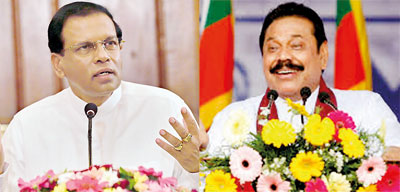Sunday Times 2
Is faked honesty the backbone of Sri Lankan democracy?
The secret of life is honesty and fair dealing. If you can fake that. You’ve got it made— Groucho Marx. That was the devastating recommendation for success in contemporary society by that lovable actor and American satirist of the 20th Century. It provides me an answer for the emergence and continued presence of the typical Sri Lankan politician—that usually rotund figure dressed in saintly white garb, ‘national’, carrying a tray of flowers with his TV camera crew trailing him. This is a man who has conned his electorate, duped his people — perhaps crossed over to another political party which he denounced as thebane of humanity on public platforms — got himself re-elected by the same people and continues merrily making up his dirty invisible pile to the ‘Jayawewas’ of the stupid multitude.

Did Sirisena and Rajapaksa hold talks to topple the Govt?
Yes, how right Groucho was. Once you know how to fake honesty, you’ve got it made.
Grand coalition
The talk last week the country was agog about the toppling of the Yahapalana Government with a constituent party of the ruling coalition, the SLFP-led by President Maithripala Sirisena and a newly formed coalition called the Pohottuwa (Sri Lanka Podujana Peramuna), SLPP led by the former defeated President Mahinda Rajapaksa coming together and governing the country.
Detailed reports of a meeting of the two leaders and talks on a new coalition government were denied but not the intention to topple the government by the SLPP although the ‘toppling’ would not be possible without a new coalition unless of course unknown strategies are under consideration.
The SLFP under President Sirisena and the SLPP led by Mahinda Rajapaksa throwing out the incumbent government and forming a new coalition for governance appears to be gross betrayal of the trust placed in them by millions — of both parties — at the last presidential election, and a travesty of democracy.
They and their parties were bitterly opposed to each other and flung many shocking allegations against each other. The country, particularly the Sinhala electorate, was bitterly divided and supporters exhausted themselves emotionally, financially and even became physical. Now, can the two leaders nonchalantly kiss and make up according to their whims and fancies forgetting those who voted them in?
Do voters matter?
Mr. Sirisena, though General Secretary of the SLFP in 2015, lacked a political punch and was politically non est till the end of that year when he walked away after an egg hopper feed with Rajapaksa to become the Common Candidate against Rajapaksa.
Ranil Wickremesinghe, the UNP leader, made way for him together with those alarmed at the dictatorial ambitions of Rajapaksa. They included leaders of the Maha Sangha, while Tamil and Muslim minorities rallied round Sirisena and made him the president. Without Ranil’s and UNP’s support, could Sirisena have made it to President’s House?
Rajapaksa’s supporters face the predicament of having as one of their leaders a man whom they have abused in the vilest of language and have no confidence in at all. But the Rajapaksas seem to take their electorates for granted as their fiefdoms and expect the people to follow them, come what may.
Whether the so-called Grand Coalition comes through or not, the attempt to form it without any reference to their electorates is indicative of the callous disregard for voters of both parties and of taking them for granted.
It could be argued that ‘politics is the art of the possible’ and elected leaders have the freedom to make decisions with changing political scenarios. This could be accepted in certain circumstances for individual politicians but not for entire political parties to somersault in this fashion. Party conventions are held where the rank and file of the party are consulted in most countries where the democratic process is respected.
But don’t blame politicians alone. This same set of politicians from all parties will contest the next elections and a great majority will be returned whatever villainy committed as has usually happened in this Sri Lankan democracy. Almost the same batch of clowns, rogues and villains go round and round. We the people don’t look beyond our noses and vote for the scoundrels nominated by our part. In most democracies the slogan is throw the scoundrels out. We believe in keeping in the scoundrels perpetually.
This is Groucho Marx’s principle of faked honesty at work. However much a politician is openly exposed to be a rogue of the first order, one who works for his sole benefit and that of his family, abuses, state privileges provided, he still comes back into politics like a bad coin.
Is faked honesty, the backbone of Sri Lankan democracy?

